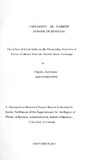| dc.description.abstract | Many studies have been done on splits in the Kenyan market i.e. the Nairobi Stock Exchange and have confirmed increased volume of shares traded alter split events. Increased trading which translates to post split high liquidity has also been evidenced.
The opinion many investors have is that many retail investors will rush and dominate the ownership of the split counters because of the optimality. My project has confirmed this notion wrong. It has confirmed an increase in number of shareholders. The ownership base broadens but with very low' or insignificant change in ownership proportion.
The insignificant change evidenced in ownership proportion is not strong enough to change the management of agency problems, for that. Kenyan splits tend to be weapons for take-over. Stock splits and number of shareholders are directly related. Ownership proportions for both Retail and Institutional investors are inversely related unlike foreign investors whose proportions in the Kenyan market increases with split.
The study confirms that a firm whose aim is to concentrate ownership should not attempt to split their stock because by not splitting, the firm will run on low managerial power. Low managerial power will always emerge where minority control is eminent. Thus, firms with lower ownership concentration like the Kenyan cases are the ones with large number of defense measures. | en_US |

